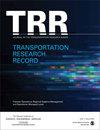疫情后城市远程工作的个人适应及其对居民搬迁的潜在影响:以伊斯坦布尔为例
IF 1.8
4区 工程技术
Q3 ENGINEERING, CIVIL
引用次数: 0
摘要
由于COVID-19大流行,远程工作被迫迅速增加,这为当今的特大城市提供了几个重要机会,可以减少交通拥堵、能源消耗、温室气体排放以及促进城市蔓延等某些威胁。大流行期间员工适应远程工作的方式及其为改善工作/生活平衡提供的潜力,为大流行后城市制定城市政策提供了指标。本研究旨在通过调查员工如何适应远程工作以及他们在大流行后离开城市的想法,研究2019冠状病毒病大流行第一阶段远程工作增加对伊斯坦布尔居民搬迁的潜在影响。为此,在2020年6月1日至6月5日期间,对居住在伊斯坦布尔市的186名员工进行了在线调查。这项调查包括调查大流行期间工作生活的变化。使用Pearson卡方检验和Mantel-Haenszel趋势检验(线性逐线性关联)分析和解释了参与者在个人特征和休闲时间偏好方面的反应差异。该研究发现了个人/社会特征与人们如何适应远程工作之间的重要关系,并提供了这些适应过程对住宅搬迁影响的重要指标。本文章由计算机程序翻译,如有差异,请以英文原文为准。
Personal Adaptations to Remote Working in the Post-Pandemic City and Its Potential Impact on Residential Relocations: The Case of Istanbul
A forced and rapid increase in remote working because of the COVID-19 pandemic has afforded today’s megacities several important opportunities for reducing traffic congestion, energy consumption, greenhouse gas emissions, and certain threats such as the promotion of urban sprawl. The way in which employees have adapted to working remotely during the pandemic and the potential it offers for improving their work/life balance provide indicators for developing urban policies in the post-pandemic city. The present study aims to examine the potential impact the increase in remote working during the first phase of the COVID-19 pandemic has had on residential relocations in Istanbul by investigating how employees have adapted to remote working and their thoughts about leaving the city after the pandemic. To do so, an online survey was conducted between June 1 and June 5, 2020 with 186 employees living in the city of Istanbul. The survey consisted of investigations into changes in work life during the pandemic. The differences between participants’ responses were analyzed and interpreted with respect to their personal characteristics and leisure-time preferences using Pearson’s chi-squared test and the Mantel–Haenszel test of trends (linear-by-linear association). The study finds significant relationships between personal/social characteristics and how people adapt to remote working and provides important indicators of the effects these adaptation processes have on residential relocations.
求助全文
通过发布文献求助,成功后即可免费获取论文全文。
去求助
来源期刊

Transportation Research Record
工程技术-工程:土木
CiteScore
3.20
自引率
11.80%
发文量
918
审稿时长
4.2 months
期刊介绍:
Transportation Research Record: Journal of the Transportation Research Board is one of the most cited and prolific transportation journals in the world, offering unparalleled depth and breadth in the coverage of transportation-related topics. The TRR publishes approximately 70 issues annually of outstanding, peer-reviewed papers presenting research findings in policy, planning, administration, economics and financing, operations, construction, design, maintenance, safety, and more, for all modes of transportation. This site provides electronic access to a full compilation of papers since the 1996 series.
 求助内容:
求助内容: 应助结果提醒方式:
应助结果提醒方式:


